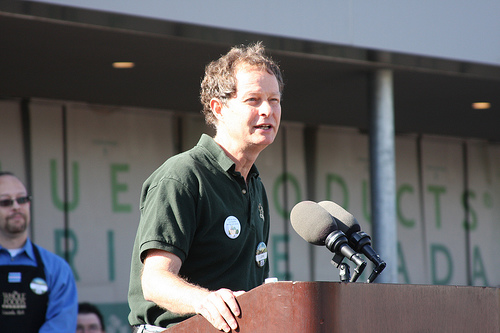In my work in Corporate Social Responsibility and sustainable business, Whole Foods has always been a company to benchmark against. They were one of the first major retailers to offset 100% of their energy use with wind energy credits; voluntarily stop using plastic bags company-wide; join the Non-GMO Project’s Product Verification Program; and develop a certification program, the Whole Trade Guarantee, in partnership with non-profits. Plus, the company has received a plethora of sustainability and environmental awards and recognition. So I was just wondering…with a track record like that, can a renegade CEO damage the company’s brand reputation as a socially responsible company? Well, John Mackey, co-founder and chief executive of Whole Foods, is sure giving it the old college try.
In the past, it was discovered that Mackey was bashing Wild Oats Markets; praising Whole Foods; and even defending his haircut under the name “Rahodeb” online in Yahoo Finance stock forums. According to the company, Mackey had been trolling online forums for at least eight years. Yikes! Where’s the transparency? Fortunately, this was only a minor blemish on the Whole Foods brand.
But Mackey’s latest op-ed in the Wall Street Journal criticizing current health care reform proposals, has me scratching my head and wondering, “Could the CEO be that out of touch with his consumer base?” Come on…we all know the folks strolling up and down the Whole Foods grocery aisles are more liberal then not and most likely support Obama’s health care reform strategy. What was Mackey thinking!? And who in the Whole Foods communications/public affairs department thought this was a good idea? Unless – they didn’t know about it, which is even more disturbing.
Hey, I’m a John Mackey fan. I believe he is a revolutionary in ethical business, and perhaps with that title “revolutionary” comes rebel. I get it. I understand he wants to express his opinion on the matter, but whether Mackey likes it or not, he is the face of Whole Foods. It may not always be fair, but it is the reality. And even though it is Mackey’s own personal views he wrote about, the public doesn’t differentiate between the CEO and the company. Plus, it’s a little hard to believe that the op-ed is all Mackey when the title is “The Whole Foods Alternative to ObamaCare”.
Consumers are angry and expressing their disagreement with Mackey the only way they know how by boycotting his company. The Boycott Whole Foods campaign even has their own group on Facebook with almost 30,000 members, and organized protests are taking place around the country. I’ve been on the company-end of a consumer campaign, and it is not fun. I’m sure the Whole Foods communications/public affairs folks are working over time. My advice to them is to engage in the dialogue with their customers and be as honest and transparent as possible. Will the Whole Foods brand re-gain its socially responsible stature? Only time will tell.
What do you think? Did John Mackey’s op-ed affect your opinion of Whole Foods?
Photo by JOE M500 at Flickr under a Creative Commons license.







Dear Cindy,
Thank you for your insightful piece. As a public relations professional, and a fan of Whole Foods, I am faced with the same questions you posted. I think John Mackey, although he does make some good points in his Op-Ed about the long waiting lists social healthcare can create (which is the case in Holland for instance), and his opposition to the litigation culture which makes health care very expensive in America, but he should have addressed this in a personal meeting with Obama’s staff members or with any other political influential figure.
Why he choose to write this Op-Ed and create this nightmare for the Whole Foods PR people? I’m still guessing that he just wanted to voice his opinions and tried to use Whole Foods as a great example, but that didn’t go so well.
Honestly, I think the Whole Foods PR people had no idea this was coming, or they would have prevented it. Or they need new people.
Doesn’t it strike you as odd though, that Whole Foods is not addressing this issue on their website? Last time I looked, on Monday, there was no word about it on their webiste.
What would you do if you were Whole Foods to turn this bad situation around?
Dear Cindy,
Thank you for your insightful piece. As a public relations professional, and a fan of Whole Foods, I am faced with the same questions you posted. I think John Mackey, although he does make some good points in his Op-Ed about the long waiting lists social healthcare can create (which is the case in Holland for instance), and his opposition to the litigation culture which makes health care very expensive in America, but he should have addressed this in a personal meeting with Obama’s staff members or with any other political influential figure.
Why he choose to write this Op-Ed and create this nightmare for the Whole Foods PR people? I’m still guessing that he just wanted to voice his opinions and tried to use Whole Foods as a great example, but that didn’t go so well.
Honestly, I think the Whole Foods PR people had no idea this was coming, or they would have prevented it. Or they need new people.
Doesn’t it strike you as odd though, that Whole Foods is not addressing this issue on their website? Last time I looked, on Monday, there was no word about it on their webiste.
What would you do if you were Whole Foods to turn this bad situation around?
Back in 2008, this Whole Foods, CEO John Mackey (how old is this kid?), was caught posting negative comments (trash talk) about a competitor on Yahoo Finance message boards in an effort to push down the stock price. So now I am suppose to take this loser seriously? Please, snore, snore.
It’s funny we hear Republicans say that they do not want “faceless bureaucrats” making medical decisions but they have no problem with “private sector” “faceless bureaucrats” daily declining medical coverage and financially ruining good hard working people (honestly where can they go with a pre-condition). And who says that the “private sector” is always right, do we forget failures like Long-Term Capital, WorldCom, Global Crossing, Enron, Tyco, AIG and Lehman Brothers. Of course the federal government will destroy heathcare by getting involved, Oh but wait, Medicare and Medicaid and our military men and women and the Senate and Congress get the best heathcare in the world, and oh, that’s right, its run by our federal government. I can understand why some may think that the federal government will fail, if you look at the past eight years as a current history, with failures like the financial meltdown and Katrina but the facts is they can and if we support them they will succeed.
How does shouting down to stop the conversation of the healthcare debate at town hall meetings, endears them to anyone. Especially when the organizations that are telling them where to go and what to do and say are Republicans political operatives, not real grassroots. How does shouting someone down or chasing them out like a “lynch mob” advanced the debate, it does not. So I think the American people will see through all of this and know, like the teabagger, the birthers, these lynch mobs types AKA “screamers” are just the same, people who have to resort to these tactics because they have no leadership to articulate what they real want. It’s easy to pickup a bus load of people who hate, and that’s all I been seeing, they hate and can’t debate. Too bad.
Back in 2008, this Whole Foods, CEO John Mackey (how old is this kid?), was caught posting negative comments (trash talk) about a competitor on Yahoo Finance message boards in an effort to push down the stock price. So now I am suppose to take this loser seriously? Please, snore, snore.
It’s funny we hear Republicans say that they do not want “faceless bureaucrats” making medical decisions but they have no problem with “private sector” “faceless bureaucrats” daily declining medical coverage and financially ruining good hard working people (honestly where can they go with a pre-condition). And who says that the “private sector” is always right, do we forget failures like Long-Term Capital, WorldCom, Global Crossing, Enron, Tyco, AIG and Lehman Brothers. Of course the federal government will destroy heathcare by getting involved, Oh but wait, Medicare and Medicaid and our military men and women and the Senate and Congress get the best heathcare in the world, and oh, that’s right, its run by our federal government. I can understand why some may think that the federal government will fail, if you look at the past eight years as a current history, with failures like the financial meltdown and Katrina but the facts is they can and if we support them they will succeed.
How does shouting down to stop the conversation of the healthcare debate at town hall meetings, endears them to anyone. Especially when the organizations that are telling them where to go and what to do and say are Republicans political operatives, not real grassroots. How does shouting someone down or chasing them out like a “lynch mob” advanced the debate, it does not. So I think the American people will see through all of this and know, like the teabagger, the birthers, these lynch mobs types AKA “screamers” are just the same, people who have to resort to these tactics because they have no leadership to articulate what they real want. It’s easy to pickup a bus load of people who hate, and that’s all I been seeing, they hate and can’t debate. Too bad.
What I find interesting about this situation is not so much what he said, it is the reaction. That there is still a culture of you are either with us 100% or you are against us (even if you are with us 98%).
That, regardless of whether his comments were right or wrong, he chose to express them is a testament to his beliefs in those words because (regardless of whether or not the PR dept knew), he knew that his comments would draw the ire of a certain percentage of his customers.
In addressing the comments from Carin Gerzon about , and why would he do that to his PR department. Perhaps he viewed this as an issue larger than them, and felt that through his OP-ed he would be able to provide a critique of the current legislation that was credible. That, as someone who started a new food movement because of his beliefs, he could open up a more constructive review of an issue that is going to impact EVERYONE, before it is passed.
What I find interesting about this situation is not so much what he said, it is the reaction. That there is still a culture of you are either with us 100% or you are against us (even if you are with us 98%).
That, regardless of whether his comments were right or wrong, he chose to express them is a testament to his beliefs in those words because (regardless of whether or not the PR dept knew), he knew that his comments would draw the ire of a certain percentage of his customers.
In addressing the comments from Carin Gerzon about , and why would he do that to his PR department. Perhaps he viewed this as an issue larger than them, and felt that through his OP-ed he would be able to provide a critique of the current legislation that was credible. That, as someone who started a new food movement because of his beliefs, he could open up a more constructive review of an issue that is going to impact EVERYONE, before it is passed.
Carin – thanks for your comment. And I agree Mackey should have had a conversation with President Obama and his admin if he had concerns. The President has been meeting with a number of CEOs to discuss health care specifically.
But, like you, I can’t figure out why he would write an op-ed. I wonder what his motivation was. Mackey is obviously passionate about the subject, and there must be another way to express his opinion in a more effective way that would not damage Whole Foods’ brand image.
If I was working with Whole Foods, I would recommend the company take some sort of action. They are already in the middle of the debate like it or not. If the backlash is low, a statement or Q&A on their website (you’re right…there is nothing on their site currently) is fine.
If reputation risk is great, I would recommend the company convene a stakeholder engagement session where all sides of the issue are invited to participate. Mackey should be present to answer questions and explain why he chose to write the op-ed. Talk about the issue from a CEO’s point of view. What’s most important is to listen to his customers…have a respectful, open discussion.
Remaining silent and hoping it will go away is the worst thing a company can do. It won’t go away. But maybe Mackey doesn’t care about his upset customers then do nothing. But be prepared for a shift in the company’s reputation.
Paul – I agree that yelling and screaming doesn’t help the situation. It only shuts people down. If folks are going to debate the issue, they should understand what they are discussing. Know the issue inside and out. You’d be surprise what can be accomplished through meaningful, respectful conversation.
We are all adults here, and as adults we know there are consequences for are actions, so if you do not agree with CEO John Mackey views on healthcare, you can a) do nothing, b) shop there, c) not shop there, d) protest and picket the stores, its your choice, live the dream!
We are all adults here, and as adults we know there are consequences for are actions, so if you do not agree with CEO John Mackey views on healthcare, you can a) do nothing, b) shop there, c) not shop there, d) protest and picket the stores, its your choice, live the dream!
John Mackey was just being himself. You, on the other hand, give it away when you admit to being a Mackey fan. You minimize his previous bad behavior because you like some of what he has done, and frankly, you want to like him. But the WSJ editorial makes it clear – this is who he is; a multimillionaire retail CEO. He doesn’t want the naiton to solve the health care crisis, in this situation he is much like any other retailer – leave things alone. He is also like any other multimillionaire CEO – not like his employees or like his customers, many of who think health care is a critical issue and needs national (read governmental) attention.
His public policy pronouncement has already had an effect, the only questions are (1) how much, and (2) how long lasting will they be. For those who thought that Mackey was something other than a multimillionaire CEO, you now know otherwise. Debating about whether or not he should have revealed himself as such is a pr debate. He is who he is, and he has reminded all of the stakeholders of such.
P.S. – I am not a Mackey fan.
John Mackey was just being himself. You, on the other hand, give it away when you admit to being a Mackey fan. You minimize his previous bad behavior because you like some of what he has done, and frankly, you want to like him. But the WSJ editorial makes it clear – this is who he is; a multimillionaire retail CEO. He doesn’t want the naiton to solve the health care crisis, in this situation he is much like any other retailer – leave things alone. He is also like any other multimillionaire CEO – not like his employees or like his customers, many of who think health care is a critical issue and needs national (read governmental) attention.
His public policy pronouncement has already had an effect, the only questions are (1) how much, and (2) how long lasting will they be. For those who thought that Mackey was something other than a multimillionaire CEO, you now know otherwise. Debating about whether or not he should have revealed himself as such is a pr debate. He is who he is, and he has reminded all of the stakeholders of such.
P.S. – I am not a Mackey fan.
Mr. Mackey is also attracting new customers with his unfashionable perspective on health care. He’s already got ailes full of liberals, perhaps he’s competing for conservative shoppers that are largely ignored by his competitors. Fox did the same thing when rolling out their news division. Why compete with CNN, ABC, CBS, and NBC for liberal news consumers when there is an untapped market of conservative viewers to be courted?
Mr. Mackey is also attracting new customers with his unfashionable perspective on health care. He’s already got ailes full of liberals, perhaps he’s competing for conservative shoppers that are largely ignored by his competitors. Fox did the same thing when rolling out their news division. Why compete with CNN, ABC, CBS, and NBC for liberal news consumers when there is an untapped market of conservative viewers to be courted?
Matt, I know I’m just about five months late in reacting to your post: but I think you’re on to something here ………Brilliant!!!
Matt, I know I’m just about five months late in reacting to your post: but I think you’re on to something here ………Brilliant!!!